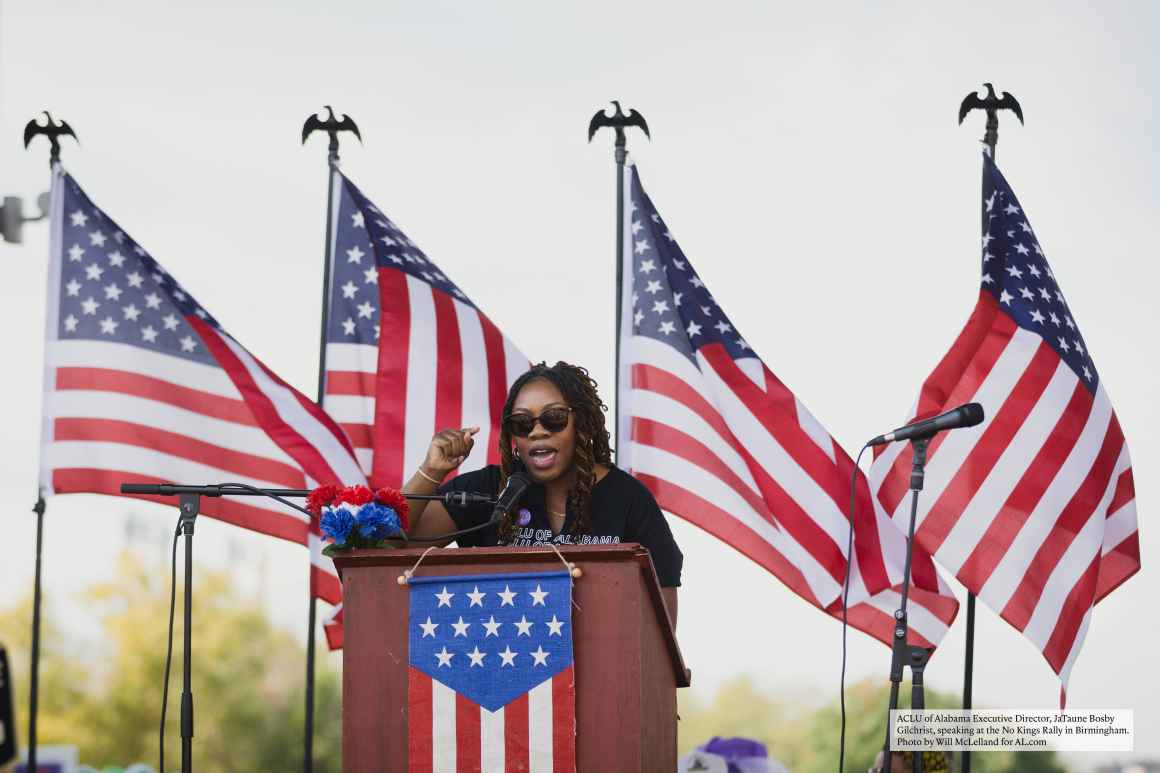This weekend, I served as one of the speakers for No Kings Day in Birmingham. The event mobilized thousands of people across the state, from Fairhope to Dadeville to Montgomery to Guntersville.
It was affirming to stand alongside thousands of Alabamians exercising their First Amendment rights. With over 7 million participants across 2700 mobilizations globally, it’s clear that the people are motivated for change.
But it is equally clear that without intentional strategy and direction, the change we need will be impossible. We must treat these No Kings actions as an entry point while understanding that this moment requires a deeper investment in the work being done on the ground.
These times, while unprecedented, are not novel. They are deeply familiar to historically silenced and marginalized communities, particularly in Alabama and the Deep South.
My remarks focused on three clear action items: resist, rest, and reimagine while understanding that power concedes nothing without a demand—and power always is in the people. This notion has guided freedom fighters, abolitionists, and activists from civil rights to anti-apartheid.

As we build off the energy of the weekend, it’s important we “Lock-In” (a term used by the GenZ’ers of our office) and focus on actionable next steps, while following the lead of those who are already doing this work in and with the community.
Next steps: Educate. Activate. Collaborate.
Educate. Education is power. Start in your own community: how do politics, activist organizations, and systems of power shape the place you live? It’s important to remember that people’s material needs are tied to political education.
- Educate yourself on local politics. While electoral politics will not be the sole determinant of transformative societal shifts, it’s critical that we understand how to leverage our power locally. Who is your state representative? What bills are they sponsoring for the 2026 legislative session? Remember, they work for you.
- Educate yourself on community issues. The environment (water, power, waste) urban planning, school funding, and infrastructure (roads and bridges) are just a few local issues that impact our daily lives. What are the biggest issues in your community? Which are the issues that you feel passionate about?
- Educate yourself on the history of Alabama and our country. Understanding our past is critical to reimagining our future. To move forward in strength, we need to know what has happened to bring us to the current moment. Ask elders in your community to share their stories, read books, visit museums, use the internet—there is a world of information available to you.
Activate. Now that you’ve educated yourself, it’s time to decide where you want to invest your energy. Find an issue that ignites you and offer your time and resources to help the folks who are already doing the work.
- Invest your time. Seek volunteer opportunities with organizations whose values align with your own.
- Invest your money. If you have money to give, invest it in organizations who are steeped in people-centered work. Community organizations are often underfunded and overworked. They rely on individual donations, and your money goes a long way.
- Offer your unique skills. We all have areas where we excel professionally and relationally. Smaller local organizations may not have the staff to draft proposals, create graphics, or table at events. Your skillset may be invaluable.
Collaborate. Collaboration requires active listening and the willingness to understand that we are stewards of this work—not owners. The systems we seek to dismantle have been strategically put in place to take away the power of our Black, Brown, immigrant, trans, and gender diverse leaders, and while we fight together, we must move from a place of trust.
- Listen. Seek out those who have already been invested in this work and learn from their experience and expertise. The best solutions always come from those who have been impacted. Learn from them.
- Build partnerships. When you find individuals and organizations whose goals align with your own, build partnerships that utilize each party’s expertise. We will always get farther together.
- Find community. The work is hard, and the road is long. Build one another up, offer support, and take rest.
The biggest lesson from No Kings Day is that these demonstrations are not the end nor the beginning of the work; they are just the surface. Real movement building is a generational practice. It requires learning what we don’t know, deepening what we do, and being in community for the long haul.
Below is a list of some organizations across Alabama that are already doing this work in and with the community. Pick an issue you're passionate about, reach out to an organization, and "lock-in" for the work ahead.
Civic Engagement & Advocacy
- Alabama Arise
- Alabama Forward
- Greater Birmingham Ministries
- League of Women Voters
- Alabama Values
- StandUp Mobile
- Alabama Disabilities Advocacy Program (ADAP)
Criminal Legal Reform
- The Ordinary People Society
- Offender Alumni Association (OAA)
- Alabama Appleseed Center for Law & Justice
- Alabama Prison Birth Project
- Redemption Earned, Inc.
- Faith in Action
Environmental/Climate Justice
Immigrants’ Rights
Racial Justice
- Alabama NAACP
- Black Women’s Round Table
- Black Lives Matter Birmingham
- Alabama Institute for Social Justice
- Selma Center for Truth and Reconciliation
- Poor People’s Campaign
- Project Say Something
Reproductive Justice & Maternal Health
- Yellowhammer Fund
- Margins
- Alabama Prison Birth Project
- West Alabama Women’s Center
- Cohosh Collaborative